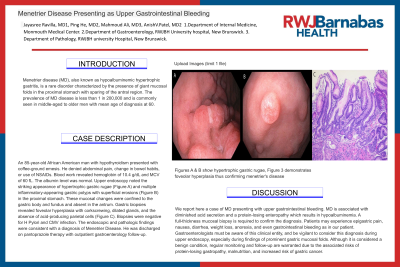Monday Poster Session
Category: Stomach
P2783 - Menetrier Disease Presenting as Upper Gastrointestinal Bleeding
Monday, October 23, 2023
10:30 AM - 4:15 PM PT
Location: Exhibit Hall

Has Audio
- JR
Jayasree Ravilla, MD
Monmouth Medical Center/RWJBH
Long Branch, NJ
Presenting Author(s)
Jayasree Ravilla, MD1, Ping He, MD2, Mahmoud Ali, MBBCh2, Anish V. Patel, MD3
1Monmouth Medical Center/RWJBH, Long Branch, NJ; 2RWJBH University Hospital, New Brunswick, NJ; 3Rutgers Robert Wood Johnson Medical School, New Brunswick, NJ
Introduction: Menetrier disease (MD), also known as hypoalbuminemic hypertrophic gastritis, is a rare disorder characterized by the presence of giant mucosal folds in the proximal stomach with sparing of the antral region. The prevalence of MD disease is less than 1 in 200,000 and is commonly seen in middle-aged to older men with mean age of diagnosis at 60.
Case Description/Methods: An 85-year-old African American man with hypothyroidism presented with coffee-ground emesis. He denied abdominal pain, change in bowel habits, or use of NSAIDs. Blood work revealed hemoglobin of 10.4 g/dL and MCV of 60 fL. The albumin level was normal. Upper endoscopy noted the striking appearance of hypertrophic gastric rugae (Figure A) and multiple inflammatory-appearing gastric polyps with superficial erosions (Figure B) in the proximal stomach. These mucosal changes were confined to the gastric body and fundus and absent in the antrum. Gastric biopsies revealed foveolar hyperplasia with corkscrewing, dilated glands, and the absence of acid-producing parietal cells (Figure C). Biopsies were negative for H Pylori and CMV infection. The endoscopic and pathologic findings were consistent with a diagnosis of Menetrier Disease. He was discharged on pantoprazole therapy with outpatient gastroenterology follow-up.
Discussion: We report here a case of MD presenting with upper gastrointestinal bleeding. MD is associated with diminished acid secretion and a protein-losing enteropathy which results in hypoalbuminemia. A full-thickness mucosal biopsy is required to confirm the diagnosis. Patients may experience epigastric pain, nausea, diarrhea, weight loss, anorexia, and even gastrointestinal bleeding as in our patient. Gastroenterologists must be aware of this clinical entity, and be vigilant to consider this diagnosis during upper endoscopy, especially during findings of prominent gastric mucosal folds. Although it is considered a benign condition, regular monitoring and follow-up are warranted due to the associated risks of protein-losing gastropathy, malnutrition, and increased risk of gastric cancer.

Disclosures:
Jayasree Ravilla, MD1, Ping He, MD2, Mahmoud Ali, MBBCh2, Anish V. Patel, MD3. P2783 - Menetrier Disease Presenting as Upper Gastrointestinal Bleeding, ACG 2023 Annual Scientific Meeting Abstracts. Vancouver, BC, Canada: American College of Gastroenterology.
1Monmouth Medical Center/RWJBH, Long Branch, NJ; 2RWJBH University Hospital, New Brunswick, NJ; 3Rutgers Robert Wood Johnson Medical School, New Brunswick, NJ
Introduction: Menetrier disease (MD), also known as hypoalbuminemic hypertrophic gastritis, is a rare disorder characterized by the presence of giant mucosal folds in the proximal stomach with sparing of the antral region. The prevalence of MD disease is less than 1 in 200,000 and is commonly seen in middle-aged to older men with mean age of diagnosis at 60.
Case Description/Methods: An 85-year-old African American man with hypothyroidism presented with coffee-ground emesis. He denied abdominal pain, change in bowel habits, or use of NSAIDs. Blood work revealed hemoglobin of 10.4 g/dL and MCV of 60 fL. The albumin level was normal. Upper endoscopy noted the striking appearance of hypertrophic gastric rugae (Figure A) and multiple inflammatory-appearing gastric polyps with superficial erosions (Figure B) in the proximal stomach. These mucosal changes were confined to the gastric body and fundus and absent in the antrum. Gastric biopsies revealed foveolar hyperplasia with corkscrewing, dilated glands, and the absence of acid-producing parietal cells (Figure C). Biopsies were negative for H Pylori and CMV infection. The endoscopic and pathologic findings were consistent with a diagnosis of Menetrier Disease. He was discharged on pantoprazole therapy with outpatient gastroenterology follow-up.
Discussion: We report here a case of MD presenting with upper gastrointestinal bleeding. MD is associated with diminished acid secretion and a protein-losing enteropathy which results in hypoalbuminemia. A full-thickness mucosal biopsy is required to confirm the diagnosis. Patients may experience epigastric pain, nausea, diarrhea, weight loss, anorexia, and even gastrointestinal bleeding as in our patient. Gastroenterologists must be aware of this clinical entity, and be vigilant to consider this diagnosis during upper endoscopy, especially during findings of prominent gastric mucosal folds. Although it is considered a benign condition, regular monitoring and follow-up are warranted due to the associated risks of protein-losing gastropathy, malnutrition, and increased risk of gastric cancer.

Figure: Figures A & B show hypertrophic gastric rugae, Figure 3 demonstrates foveolar hyperplasia thus confirming menetrier's disease
Disclosures:
Jayasree Ravilla indicated no relevant financial relationships.
Ping He indicated no relevant financial relationships.
Mahmoud Ali indicated no relevant financial relationships.
Anish Patel indicated no relevant financial relationships.
Jayasree Ravilla, MD1, Ping He, MD2, Mahmoud Ali, MBBCh2, Anish V. Patel, MD3. P2783 - Menetrier Disease Presenting as Upper Gastrointestinal Bleeding, ACG 2023 Annual Scientific Meeting Abstracts. Vancouver, BC, Canada: American College of Gastroenterology.

